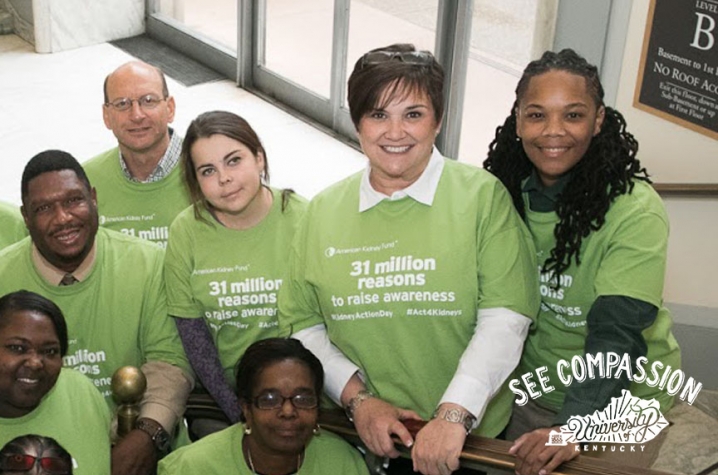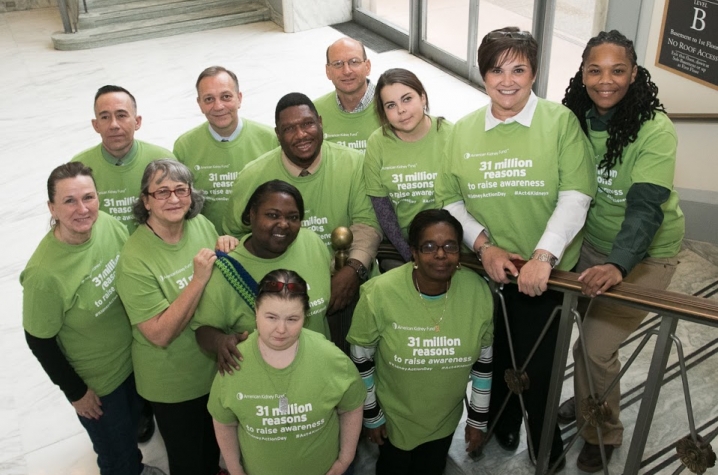UK Transplant Patient Uses Personal Experiences to Help Others
LEXINGTON, Ky. (April 27, 2015) — As a University of Kentucky Transplant Center patient navigator, Elaine Milem helps patients through the difficult process of preparing for and undergoing kidney transplants. The unique part? Milem, a two-time kidney recipient herself, understands exactly what her patients are going through.
"Everything that's happened to me so far has prepared me for this," Milem said. "I'm exactly where I'm supposed to be."
As a child, Milem suffered from regular kidney problems, including recurrent urinary tract infections. It seemed mostly an inconvenience until Milem became pregnant at age 25, when the stress of pregnancy caused her kidney function to decrease drastically.
Milem began preparing for dialysis in 2005 and also began discussing the possibility of a transplant with her physicians. Though she could have gone to several other nearby transplant centers in the region, the South Point, Ohio native decided to come to the University of Kentucky Transplant Center for her care, citing the relatively short drive and the family support she had in the area.
"The warmth and compassion I received from the nurses and staff at my first visit let me know immediately I was in the right place," Milem said. "They made me feel at home."
Milem received a donor kidney in 2007, but her good fortune was short-lived. She contracted a rare virus known as the BK virus, which caused her body to reject the kidney over the next two years. She was put back on dialysis in 2009 and re-listed for transplant in 2011, receiving her second kidney in February 2012.
In 2013, Milem was approached by UK Transplant Coordinator Angela Zimmerman with a unique offer — UK was participating in a study that looked at whether or not patient navigators help patients get further along in the transplant process. Patient navigators, as the name suggests, help "guide" new patients through the complexities of a severe illness. That may include helping patients address barriers to care (such as transportation to appointments, finding child care, figuring out insurance issues), understanding treatment and care options, helping patients research their disease, working with family members and caregivers, and much more.
One of the main requirements for UK's new patient navigator job through the study was that the navigators be transplant patients themselves. Milem, who already had a strong background in the medical field — she worked at Cabell Huntington Hospital in West Virginia for more than two decades — jumped at the chance to apply all her life experiences in a position that could help others. As a patient navigator for kidney transplant patients at UK, she counsels patients during their visits, offering everything from education on the transplant process to personal encouragement.
"Sometimes you're kind of a cheerleader," Milem said. "And sometimes you're just giving them information."
And so far, that dual role of cheerleader/educator is working. The results of the study were so successful that Milem plans to remain at UK and continue as a patient navigator outside of the research.
Additionally, she also seeks out other ways to educate others on kidney disease — Milem was recently selected by the American Kidney Fund to participate in the organization's sixth annual advocacy day on Capitol Hill. While there, she met with Congressional offices to discuss legislation that would improve care for individuals with chronic kidney disease.
Though she is currently dealing with another new kidney disease, Milem remains upbeat about her transplant experience. Most patients on dialysis have to receive the treatment three times a week, which makes traveling difficult if not impossible. Thanks to her transplant, Milem was able to visit Boston last year for a very important event: her daughter's graduation from Harvard University.
"Because of my transplant, I was able to see my daughter graduate in person," Milem said. "That means so much to me."
ABOUT ORGAN DONATION
Although hospitals are obligated by law to identify potential donors and allow the organ donor procurement program to inform families of their right to donate, anyone can sign up to become an organ donor by joining the Kentucky Organ Donor Registry. The registry is a safe and secure electronic database where a person’s wishes regarding donation will be carried out as requested.
To join the registry, visit www.donatelifeky.org or sign up when you renew your driver’s license. The donor registry enables family members to know that you chose to save and enhance lives through donation. Kentucky’s “First Person Consent” laws mean that the wishes of an individual on the registry will be carried out as requested.
MEDIA CONTACT: Allison Perry, (859) 323-2399 or allison.perry@uky.edu






